Analysis of Partnership in Health and Social Care Services Report
VerifiedAdded on 2020/06/06
|9
|2647
|23
Report
AI Summary
This report delves into the critical role of partnership working within the health and social care sector, emphasizing its significance in addressing the increasing prevalence of physical and mental health issues, particularly in the UK. The report is structured to explore the foundational philosophies underpinning collaborative efforts, including ethical partnerships, deontology, and utilitarianism, highlighting their impact on decision-making and service delivery. It evaluates the dynamics of partnership relations, identifying key factors such as leadership, strategy, organization, learning, resources, and evaluation as essential for successful collaboration. Furthermore, the report analyzes various partnership models, organizational practices, and legislative frameworks that influence collaborative working. It also examines the potential barriers to collaboration and proposes strategies for improving outcomes for both service users and professional organizations within the health and social care sector. The report concludes by emphasizing the importance of effective partnerships in enhancing service quality and addressing the complex needs of individuals and communities.

WORKING IN
PARTNERSHIP WITH
HEALTH AND SOCIAL
CARE
PARTNERSHIP WITH
HEALTH AND SOCIAL
CARE
Paraphrase This Document
Need a fresh take? Get an instant paraphrase of this document with our AI Paraphraser
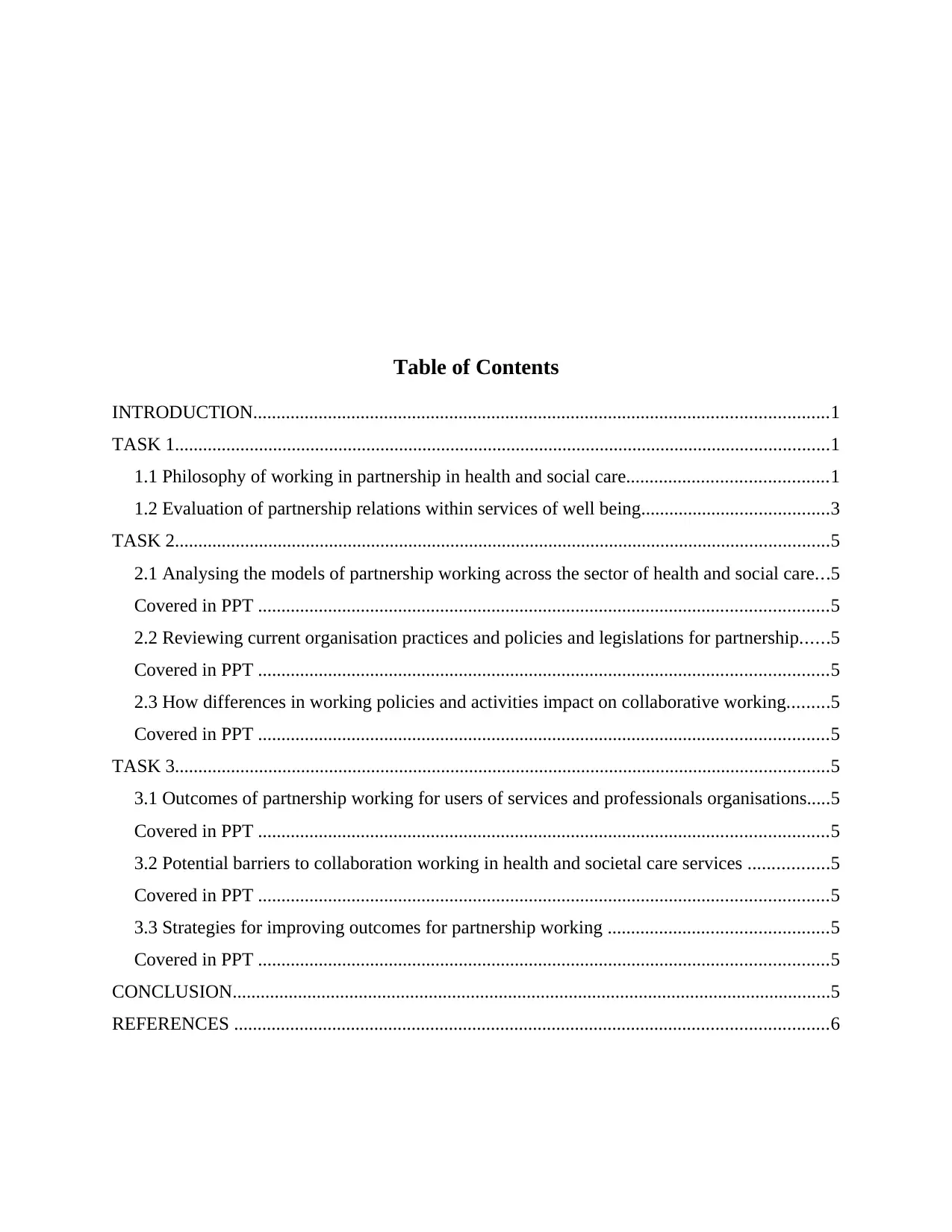
Table of Contents
INTRODUCTION...........................................................................................................................1
TASK 1............................................................................................................................................1
1.1 Philosophy of working in partnership in health and social care...........................................1
1.2 Evaluation of partnership relations within services of well being........................................3
TASK 2............................................................................................................................................5
2.1 Analysing the models of partnership working across the sector of health and social care...5
Covered in PPT ..........................................................................................................................5
2.2 Reviewing current organisation practices and policies and legislations for partnership......5
Covered in PPT ..........................................................................................................................5
2.3 How differences in working policies and activities impact on collaborative working.........5
Covered in PPT ..........................................................................................................................5
TASK 3............................................................................................................................................5
3.1 Outcomes of partnership working for users of services and professionals organisations.....5
Covered in PPT ..........................................................................................................................5
3.2 Potential barriers to collaboration working in health and societal care services .................5
Covered in PPT ..........................................................................................................................5
3.3 Strategies for improving outcomes for partnership working ...............................................5
Covered in PPT ..........................................................................................................................5
CONCLUSION................................................................................................................................5
REFERENCES ...............................................................................................................................6
INTRODUCTION...........................................................................................................................1
TASK 1............................................................................................................................................1
1.1 Philosophy of working in partnership in health and social care...........................................1
1.2 Evaluation of partnership relations within services of well being........................................3
TASK 2............................................................................................................................................5
2.1 Analysing the models of partnership working across the sector of health and social care...5
Covered in PPT ..........................................................................................................................5
2.2 Reviewing current organisation practices and policies and legislations for partnership......5
Covered in PPT ..........................................................................................................................5
2.3 How differences in working policies and activities impact on collaborative working.........5
Covered in PPT ..........................................................................................................................5
TASK 3............................................................................................................................................5
3.1 Outcomes of partnership working for users of services and professionals organisations.....5
Covered in PPT ..........................................................................................................................5
3.2 Potential barriers to collaboration working in health and societal care services .................5
Covered in PPT ..........................................................................................................................5
3.3 Strategies for improving outcomes for partnership working ...............................................5
Covered in PPT ..........................................................................................................................5
CONCLUSION................................................................................................................................5
REFERENCES ...............................................................................................................................6

⊘ This is a preview!⊘
Do you want full access?
Subscribe today to unlock all pages.

Trusted by 1+ million students worldwide
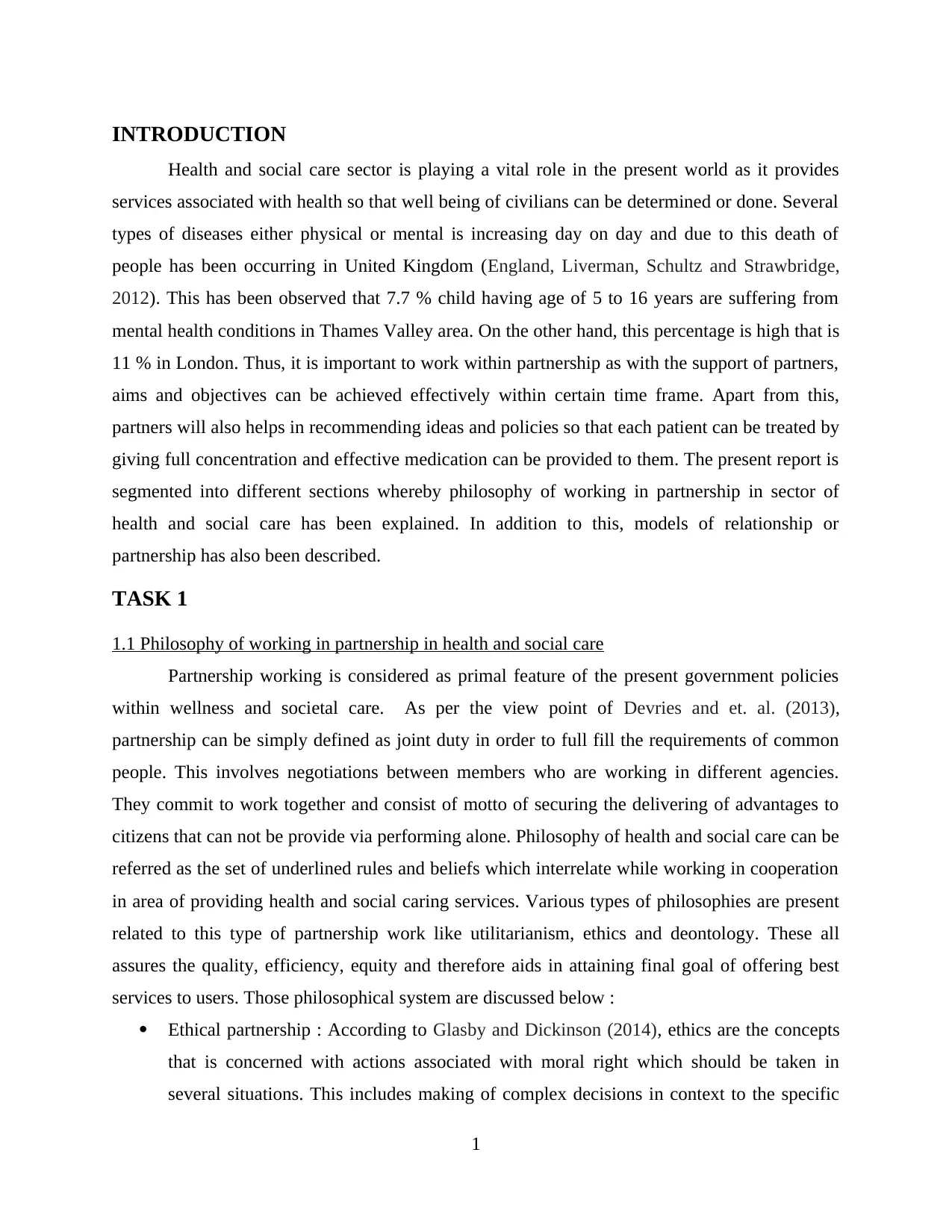
INTRODUCTION
Health and social care sector is playing a vital role in the present world as it provides
services associated with health so that well being of civilians can be determined or done. Several
types of diseases either physical or mental is increasing day on day and due to this death of
people has been occurring in United Kingdom (England, Liverman, Schultz and Strawbridge,
2012). This has been observed that 7.7 % child having age of 5 to 16 years are suffering from
mental health conditions in Thames Valley area. On the other hand, this percentage is high that is
11 % in London. Thus, it is important to work within partnership as with the support of partners,
aims and objectives can be achieved effectively within certain time frame. Apart from this,
partners will also helps in recommending ideas and policies so that each patient can be treated by
giving full concentration and effective medication can be provided to them. The present report is
segmented into different sections whereby philosophy of working in partnership in sector of
health and social care has been explained. In addition to this, models of relationship or
partnership has also been described.
TASK 1
1.1 Philosophy of working in partnership in health and social care
Partnership working is considered as primal feature of the present government policies
within wellness and societal care. As per the view point of Devries and et. al. (2013),
partnership can be simply defined as joint duty in order to full fill the requirements of common
people. This involves negotiations between members who are working in different agencies.
They commit to work together and consist of motto of securing the delivering of advantages to
citizens that can not be provide via performing alone. Philosophy of health and social care can be
referred as the set of underlined rules and beliefs which interrelate while working in cooperation
in area of providing health and social caring services. Various types of philosophies are present
related to this type of partnership work like utilitarianism, ethics and deontology. These all
assures the quality, efficiency, equity and therefore aids in attaining final goal of offering best
services to users. Those philosophical system are discussed below :
Ethical partnership : According to Glasby and Dickinson (2014), ethics are the concepts
that is concerned with actions associated with moral right which should be taken in
several situations. This includes making of complex decisions in context to the specific
1
Health and social care sector is playing a vital role in the present world as it provides
services associated with health so that well being of civilians can be determined or done. Several
types of diseases either physical or mental is increasing day on day and due to this death of
people has been occurring in United Kingdom (England, Liverman, Schultz and Strawbridge,
2012). This has been observed that 7.7 % child having age of 5 to 16 years are suffering from
mental health conditions in Thames Valley area. On the other hand, this percentage is high that is
11 % in London. Thus, it is important to work within partnership as with the support of partners,
aims and objectives can be achieved effectively within certain time frame. Apart from this,
partners will also helps in recommending ideas and policies so that each patient can be treated by
giving full concentration and effective medication can be provided to them. The present report is
segmented into different sections whereby philosophy of working in partnership in sector of
health and social care has been explained. In addition to this, models of relationship or
partnership has also been described.
TASK 1
1.1 Philosophy of working in partnership in health and social care
Partnership working is considered as primal feature of the present government policies
within wellness and societal care. As per the view point of Devries and et. al. (2013),
partnership can be simply defined as joint duty in order to full fill the requirements of common
people. This involves negotiations between members who are working in different agencies.
They commit to work together and consist of motto of securing the delivering of advantages to
citizens that can not be provide via performing alone. Philosophy of health and social care can be
referred as the set of underlined rules and beliefs which interrelate while working in cooperation
in area of providing health and social caring services. Various types of philosophies are present
related to this type of partnership work like utilitarianism, ethics and deontology. These all
assures the quality, efficiency, equity and therefore aids in attaining final goal of offering best
services to users. Those philosophical system are discussed below :
Ethical partnership : According to Glasby and Dickinson (2014), ethics are the concepts
that is concerned with actions associated with moral right which should be taken in
several situations. This includes making of complex decisions in context to the specific
1
Paraphrase This Document
Need a fresh take? Get an instant paraphrase of this document with our AI Paraphraser
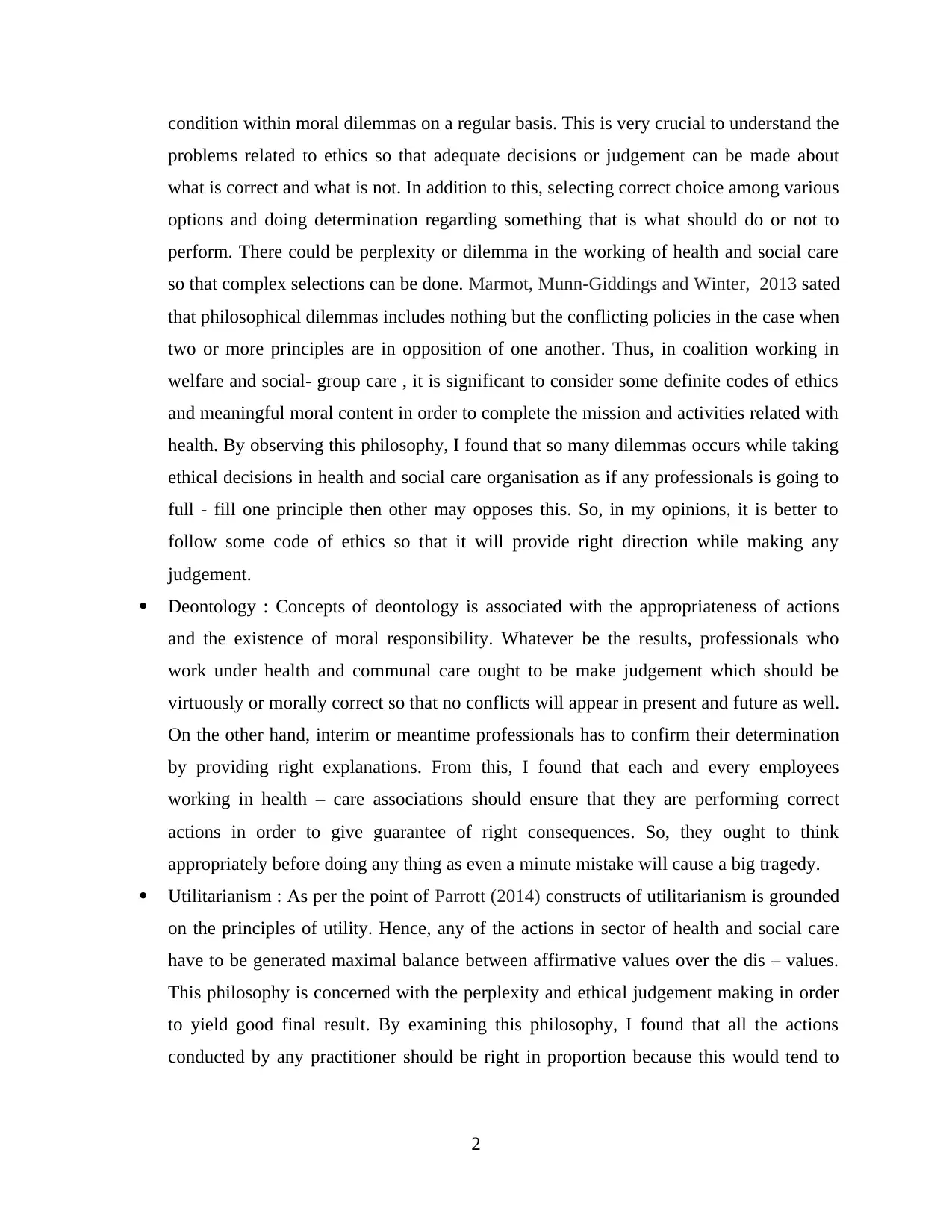
condition within moral dilemmas on a regular basis. This is very crucial to understand the
problems related to ethics so that adequate decisions or judgement can be made about
what is correct and what is not. In addition to this, selecting correct choice among various
options and doing determination regarding something that is what should do or not to
perform. There could be perplexity or dilemma in the working of health and social care
so that complex selections can be done. Marmot, Munn-Giddings and Winter, 2013 sated
that philosophical dilemmas includes nothing but the conflicting policies in the case when
two or more principles are in opposition of one another. Thus, in coalition working in
welfare and social- group care , it is significant to consider some definite codes of ethics
and meaningful moral content in order to complete the mission and activities related with
health. By observing this philosophy, I found that so many dilemmas occurs while taking
ethical decisions in health and social care organisation as if any professionals is going to
full - fill one principle then other may opposes this. So, in my opinions, it is better to
follow some code of ethics so that it will provide right direction while making any
judgement.
Deontology : Concepts of deontology is associated with the appropriateness of actions
and the existence of moral responsibility. Whatever be the results, professionals who
work under health and communal care ought to be make judgement which should be
virtuously or morally correct so that no conflicts will appear in present and future as well.
On the other hand, interim or meantime professionals has to confirm their determination
by providing right explanations. From this, I found that each and every employees
working in health – care associations should ensure that they are performing correct
actions in order to give guarantee of right consequences. So, they ought to think
appropriately before doing any thing as even a minute mistake will cause a big tragedy.
Utilitarianism : As per the point of Parrott (2014) constructs of utilitarianism is grounded
on the principles of utility. Hence, any of the actions in sector of health and social care
have to be generated maximal balance between affirmative values over the dis – values.
This philosophy is concerned with the perplexity and ethical judgement making in order
to yield good final result. By examining this philosophy, I found that all the actions
conducted by any practitioner should be right in proportion because this would tend to
2
problems related to ethics so that adequate decisions or judgement can be made about
what is correct and what is not. In addition to this, selecting correct choice among various
options and doing determination regarding something that is what should do or not to
perform. There could be perplexity or dilemma in the working of health and social care
so that complex selections can be done. Marmot, Munn-Giddings and Winter, 2013 sated
that philosophical dilemmas includes nothing but the conflicting policies in the case when
two or more principles are in opposition of one another. Thus, in coalition working in
welfare and social- group care , it is significant to consider some definite codes of ethics
and meaningful moral content in order to complete the mission and activities related with
health. By observing this philosophy, I found that so many dilemmas occurs while taking
ethical decisions in health and social care organisation as if any professionals is going to
full - fill one principle then other may opposes this. So, in my opinions, it is better to
follow some code of ethics so that it will provide right direction while making any
judgement.
Deontology : Concepts of deontology is associated with the appropriateness of actions
and the existence of moral responsibility. Whatever be the results, professionals who
work under health and communal care ought to be make judgement which should be
virtuously or morally correct so that no conflicts will appear in present and future as well.
On the other hand, interim or meantime professionals has to confirm their determination
by providing right explanations. From this, I found that each and every employees
working in health – care associations should ensure that they are performing correct
actions in order to give guarantee of right consequences. So, they ought to think
appropriately before doing any thing as even a minute mistake will cause a big tragedy.
Utilitarianism : As per the point of Parrott (2014) constructs of utilitarianism is grounded
on the principles of utility. Hence, any of the actions in sector of health and social care
have to be generated maximal balance between affirmative values over the dis – values.
This philosophy is concerned with the perplexity and ethical judgement making in order
to yield good final result. By examining this philosophy, I found that all the actions
conducted by any practitioner should be right in proportion because this would tend to
2
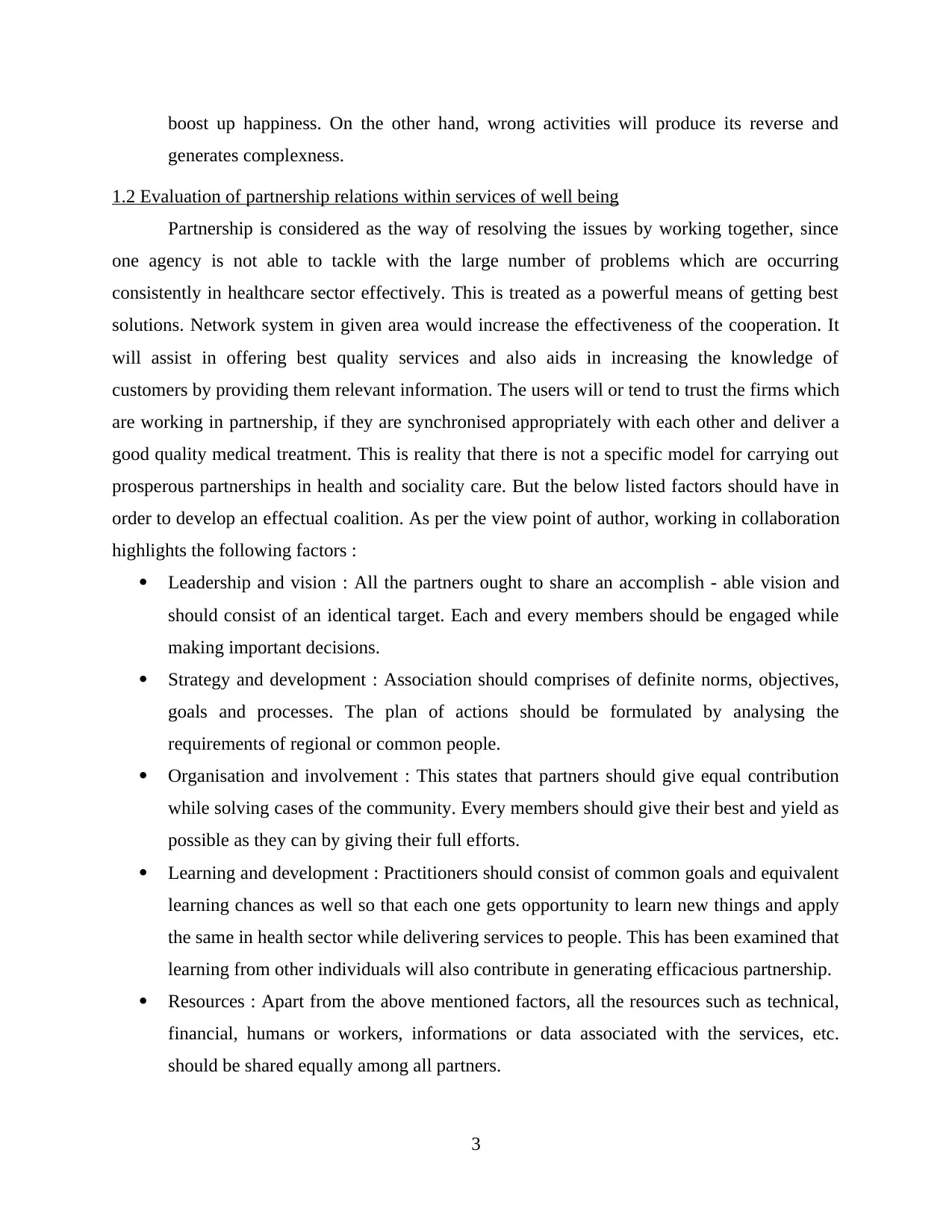
boost up happiness. On the other hand, wrong activities will produce its reverse and
generates complexness.
1.2 Evaluation of partnership relations within services of well being
Partnership is considered as the way of resolving the issues by working together, since
one agency is not able to tackle with the large number of problems which are occurring
consistently in healthcare sector effectively. This is treated as a powerful means of getting best
solutions. Network system in given area would increase the effectiveness of the cooperation. It
will assist in offering best quality services and also aids in increasing the knowledge of
customers by providing them relevant information. The users will or tend to trust the firms which
are working in partnership, if they are synchronised appropriately with each other and deliver a
good quality medical treatment. This is reality that there is not a specific model for carrying out
prosperous partnerships in health and sociality care. But the below listed factors should have in
order to develop an effectual coalition. As per the view point of author, working in collaboration
highlights the following factors :
Leadership and vision : All the partners ought to share an accomplish - able vision and
should consist of an identical target. Each and every members should be engaged while
making important decisions.
Strategy and development : Association should comprises of definite norms, objectives,
goals and processes. The plan of actions should be formulated by analysing the
requirements of regional or common people.
Organisation and involvement : This states that partners should give equal contribution
while solving cases of the community. Every members should give their best and yield as
possible as they can by giving their full efforts.
Learning and development : Practitioners should consist of common goals and equivalent
learning chances as well so that each one gets opportunity to learn new things and apply
the same in health sector while delivering services to people. This has been examined that
learning from other individuals will also contribute in generating efficacious partnership.
Resources : Apart from the above mentioned factors, all the resources such as technical,
financial, humans or workers, informations or data associated with the services, etc.
should be shared equally among all partners.
3
generates complexness.
1.2 Evaluation of partnership relations within services of well being
Partnership is considered as the way of resolving the issues by working together, since
one agency is not able to tackle with the large number of problems which are occurring
consistently in healthcare sector effectively. This is treated as a powerful means of getting best
solutions. Network system in given area would increase the effectiveness of the cooperation. It
will assist in offering best quality services and also aids in increasing the knowledge of
customers by providing them relevant information. The users will or tend to trust the firms which
are working in partnership, if they are synchronised appropriately with each other and deliver a
good quality medical treatment. This is reality that there is not a specific model for carrying out
prosperous partnerships in health and sociality care. But the below listed factors should have in
order to develop an effectual coalition. As per the view point of author, working in collaboration
highlights the following factors :
Leadership and vision : All the partners ought to share an accomplish - able vision and
should consist of an identical target. Each and every members should be engaged while
making important decisions.
Strategy and development : Association should comprises of definite norms, objectives,
goals and processes. The plan of actions should be formulated by analysing the
requirements of regional or common people.
Organisation and involvement : This states that partners should give equal contribution
while solving cases of the community. Every members should give their best and yield as
possible as they can by giving their full efforts.
Learning and development : Practitioners should consist of common goals and equivalent
learning chances as well so that each one gets opportunity to learn new things and apply
the same in health sector while delivering services to people. This has been examined that
learning from other individuals will also contribute in generating efficacious partnership.
Resources : Apart from the above mentioned factors, all the resources such as technical,
financial, humans or workers, informations or data associated with the services, etc.
should be shared equally among all partners.
3
⊘ This is a preview!⊘
Do you want full access?
Subscribe today to unlock all pages.

Trusted by 1+ million students worldwide
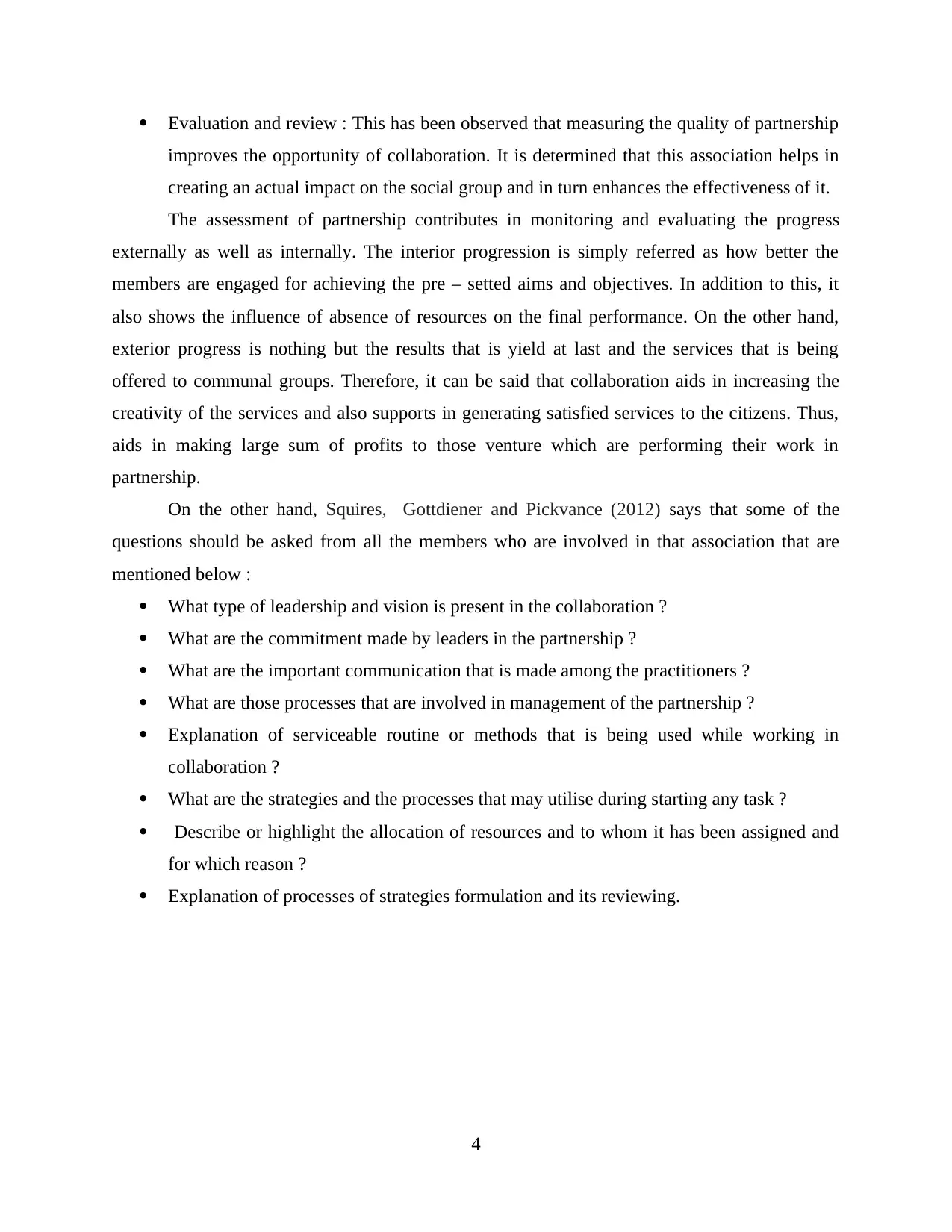
Evaluation and review : This has been observed that measuring the quality of partnership
improves the opportunity of collaboration. It is determined that this association helps in
creating an actual impact on the social group and in turn enhances the effectiveness of it.
The assessment of partnership contributes in monitoring and evaluating the progress
externally as well as internally. The interior progression is simply referred as how better the
members are engaged for achieving the pre – setted aims and objectives. In addition to this, it
also shows the influence of absence of resources on the final performance. On the other hand,
exterior progress is nothing but the results that is yield at last and the services that is being
offered to communal groups. Therefore, it can be said that collaboration aids in increasing the
creativity of the services and also supports in generating satisfied services to the citizens. Thus,
aids in making large sum of profits to those venture which are performing their work in
partnership.
On the other hand, Squires, Gottdiener and Pickvance (2012) says that some of the
questions should be asked from all the members who are involved in that association that are
mentioned below :
What type of leadership and vision is present in the collaboration ?
What are the commitment made by leaders in the partnership ?
What are the important communication that is made among the practitioners ?
What are those processes that are involved in management of the partnership ?
Explanation of serviceable routine or methods that is being used while working in
collaboration ?
What are the strategies and the processes that may utilise during starting any task ?
Describe or highlight the allocation of resources and to whom it has been assigned and
for which reason ?
Explanation of processes of strategies formulation and its reviewing.
4
improves the opportunity of collaboration. It is determined that this association helps in
creating an actual impact on the social group and in turn enhances the effectiveness of it.
The assessment of partnership contributes in monitoring and evaluating the progress
externally as well as internally. The interior progression is simply referred as how better the
members are engaged for achieving the pre – setted aims and objectives. In addition to this, it
also shows the influence of absence of resources on the final performance. On the other hand,
exterior progress is nothing but the results that is yield at last and the services that is being
offered to communal groups. Therefore, it can be said that collaboration aids in increasing the
creativity of the services and also supports in generating satisfied services to the citizens. Thus,
aids in making large sum of profits to those venture which are performing their work in
partnership.
On the other hand, Squires, Gottdiener and Pickvance (2012) says that some of the
questions should be asked from all the members who are involved in that association that are
mentioned below :
What type of leadership and vision is present in the collaboration ?
What are the commitment made by leaders in the partnership ?
What are the important communication that is made among the practitioners ?
What are those processes that are involved in management of the partnership ?
Explanation of serviceable routine or methods that is being used while working in
collaboration ?
What are the strategies and the processes that may utilise during starting any task ?
Describe or highlight the allocation of resources and to whom it has been assigned and
for which reason ?
Explanation of processes of strategies formulation and its reviewing.
4
Paraphrase This Document
Need a fresh take? Get an instant paraphrase of this document with our AI Paraphraser
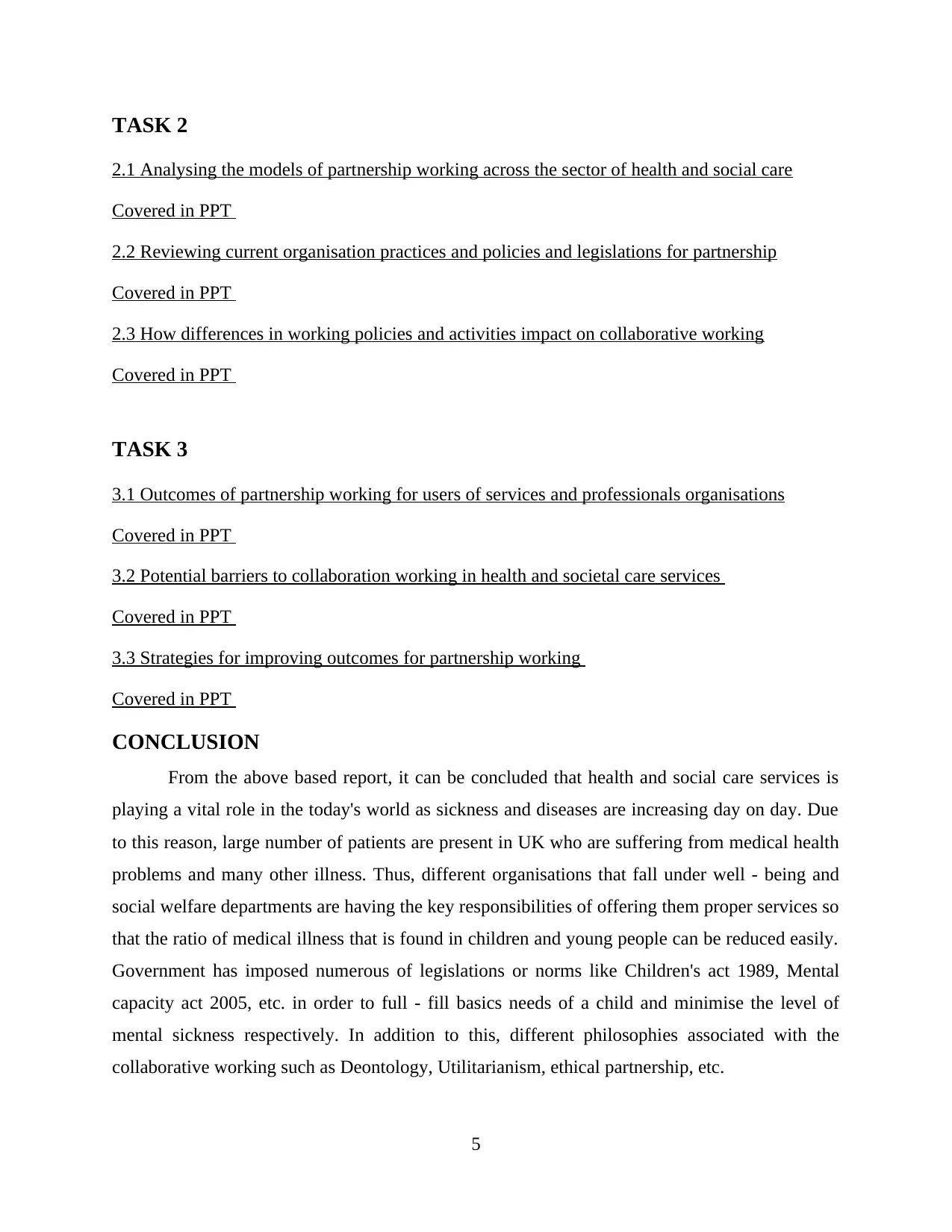
TASK 2
2.1 Analysing the models of partnership working across the sector of health and social care
Covered in PPT
2.2 Reviewing current organisation practices and policies and legislations for partnership
Covered in PPT
2.3 How differences in working policies and activities impact on collaborative working
Covered in PPT
TASK 3
3.1 Outcomes of partnership working for users of services and professionals organisations
Covered in PPT
3.2 Potential barriers to collaboration working in health and societal care services
Covered in PPT
3.3 Strategies for improving outcomes for partnership working
Covered in PPT
CONCLUSION
From the above based report, it can be concluded that health and social care services is
playing a vital role in the today's world as sickness and diseases are increasing day on day. Due
to this reason, large number of patients are present in UK who are suffering from medical health
problems and many other illness. Thus, different organisations that fall under well - being and
social welfare departments are having the key responsibilities of offering them proper services so
that the ratio of medical illness that is found in children and young people can be reduced easily.
Government has imposed numerous of legislations or norms like Children's act 1989, Mental
capacity act 2005, etc. in order to full - fill basics needs of a child and minimise the level of
mental sickness respectively. In addition to this, different philosophies associated with the
collaborative working such as Deontology, Utilitarianism, ethical partnership, etc.
5
2.1 Analysing the models of partnership working across the sector of health and social care
Covered in PPT
2.2 Reviewing current organisation practices and policies and legislations for partnership
Covered in PPT
2.3 How differences in working policies and activities impact on collaborative working
Covered in PPT
TASK 3
3.1 Outcomes of partnership working for users of services and professionals organisations
Covered in PPT
3.2 Potential barriers to collaboration working in health and societal care services
Covered in PPT
3.3 Strategies for improving outcomes for partnership working
Covered in PPT
CONCLUSION
From the above based report, it can be concluded that health and social care services is
playing a vital role in the today's world as sickness and diseases are increasing day on day. Due
to this reason, large number of patients are present in UK who are suffering from medical health
problems and many other illness. Thus, different organisations that fall under well - being and
social welfare departments are having the key responsibilities of offering them proper services so
that the ratio of medical illness that is found in children and young people can be reduced easily.
Government has imposed numerous of legislations or norms like Children's act 1989, Mental
capacity act 2005, etc. in order to full - fill basics needs of a child and minimise the level of
mental sickness respectively. In addition to this, different philosophies associated with the
collaborative working such as Deontology, Utilitarianism, ethical partnership, etc.
5
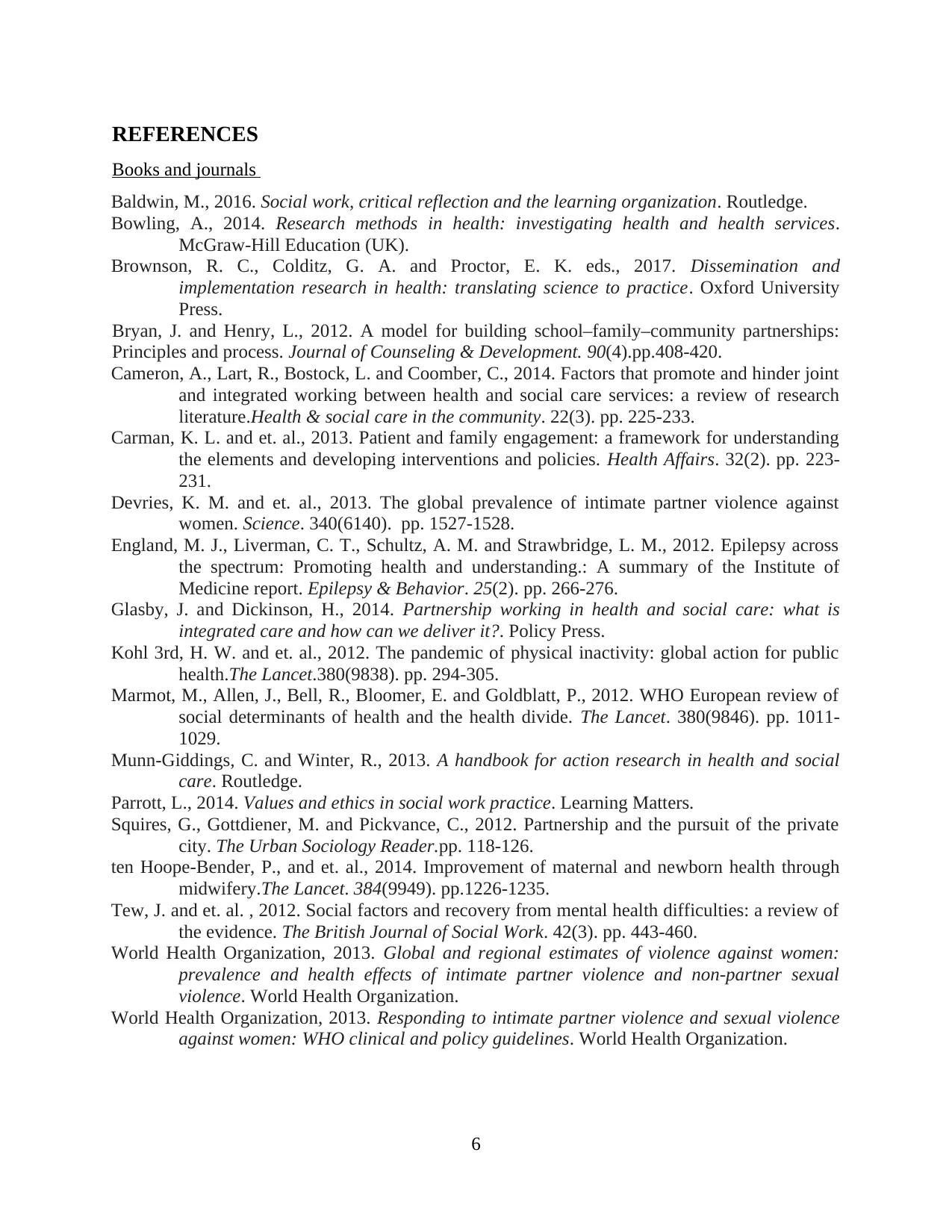
REFERENCES
Books and journals
Baldwin, M., 2016. Social work, critical reflection and the learning organization. Routledge.
Bowling, A., 2014. Research methods in health: investigating health and health services.
McGraw-Hill Education (UK).
Brownson, R. C., Colditz, G. A. and Proctor, E. K. eds., 2017. Dissemination and
implementation research in health: translating science to practice. Oxford University
Press.
Bryan, J. and Henry, L., 2012. A model for building school–family–community partnerships:
Principles and process. Journal of Counseling & Development. 90(4).pp.408-420.
Cameron, A., Lart, R., Bostock, L. and Coomber, C., 2014. Factors that promote and hinder joint
and integrated working between health and social care services: a review of research
literature.Health & social care in the community. 22(3). pp. 225-233.
Carman, K. L. and et. al., 2013. Patient and family engagement: a framework for understanding
the elements and developing interventions and policies. Health Affairs. 32(2). pp. 223-
231.
Devries, K. M. and et. al., 2013. The global prevalence of intimate partner violence against
women. Science. 340(6140). pp. 1527-1528.
England, M. J., Liverman, C. T., Schultz, A. M. and Strawbridge, L. M., 2012. Epilepsy across
the spectrum: Promoting health and understanding.: A summary of the Institute of
Medicine report. Epilepsy & Behavior. 25(2). pp. 266-276.
Glasby, J. and Dickinson, H., 2014. Partnership working in health and social care: what is
integrated care and how can we deliver it?. Policy Press.
Kohl 3rd, H. W. and et. al., 2012. The pandemic of physical inactivity: global action for public
health.The Lancet.380(9838). pp. 294-305.
Marmot, M., Allen, J., Bell, R., Bloomer, E. and Goldblatt, P., 2012. WHO European review of
social determinants of health and the health divide. The Lancet. 380(9846). pp. 1011-
1029.
Munn-Giddings, C. and Winter, R., 2013. A handbook for action research in health and social
care. Routledge.
Parrott, L., 2014. Values and ethics in social work practice. Learning Matters.
Squires, G., Gottdiener, M. and Pickvance, C., 2012. Partnership and the pursuit of the private
city. The Urban Sociology Reader.pp. 118-126.
ten Hoope-Bender, P., and et. al., 2014. Improvement of maternal and newborn health through
midwifery.The Lancet. 384(9949). pp.1226-1235.
Tew, J. and et. al. , 2012. Social factors and recovery from mental health difficulties: a review of
the evidence. The British Journal of Social Work. 42(3). pp. 443-460.
World Health Organization, 2013. Global and regional estimates of violence against women:
prevalence and health effects of intimate partner violence and non-partner sexual
violence. World Health Organization.
World Health Organization, 2013. Responding to intimate partner violence and sexual violence
against women: WHO clinical and policy guidelines. World Health Organization.
6
Books and journals
Baldwin, M., 2016. Social work, critical reflection and the learning organization. Routledge.
Bowling, A., 2014. Research methods in health: investigating health and health services.
McGraw-Hill Education (UK).
Brownson, R. C., Colditz, G. A. and Proctor, E. K. eds., 2017. Dissemination and
implementation research in health: translating science to practice. Oxford University
Press.
Bryan, J. and Henry, L., 2012. A model for building school–family–community partnerships:
Principles and process. Journal of Counseling & Development. 90(4).pp.408-420.
Cameron, A., Lart, R., Bostock, L. and Coomber, C., 2014. Factors that promote and hinder joint
and integrated working between health and social care services: a review of research
literature.Health & social care in the community. 22(3). pp. 225-233.
Carman, K. L. and et. al., 2013. Patient and family engagement: a framework for understanding
the elements and developing interventions and policies. Health Affairs. 32(2). pp. 223-
231.
Devries, K. M. and et. al., 2013. The global prevalence of intimate partner violence against
women. Science. 340(6140). pp. 1527-1528.
England, M. J., Liverman, C. T., Schultz, A. M. and Strawbridge, L. M., 2012. Epilepsy across
the spectrum: Promoting health and understanding.: A summary of the Institute of
Medicine report. Epilepsy & Behavior. 25(2). pp. 266-276.
Glasby, J. and Dickinson, H., 2014. Partnership working in health and social care: what is
integrated care and how can we deliver it?. Policy Press.
Kohl 3rd, H. W. and et. al., 2012. The pandemic of physical inactivity: global action for public
health.The Lancet.380(9838). pp. 294-305.
Marmot, M., Allen, J., Bell, R., Bloomer, E. and Goldblatt, P., 2012. WHO European review of
social determinants of health and the health divide. The Lancet. 380(9846). pp. 1011-
1029.
Munn-Giddings, C. and Winter, R., 2013. A handbook for action research in health and social
care. Routledge.
Parrott, L., 2014. Values and ethics in social work practice. Learning Matters.
Squires, G., Gottdiener, M. and Pickvance, C., 2012. Partnership and the pursuit of the private
city. The Urban Sociology Reader.pp. 118-126.
ten Hoope-Bender, P., and et. al., 2014. Improvement of maternal and newborn health through
midwifery.The Lancet. 384(9949). pp.1226-1235.
Tew, J. and et. al. , 2012. Social factors and recovery from mental health difficulties: a review of
the evidence. The British Journal of Social Work. 42(3). pp. 443-460.
World Health Organization, 2013. Global and regional estimates of violence against women:
prevalence and health effects of intimate partner violence and non-partner sexual
violence. World Health Organization.
World Health Organization, 2013. Responding to intimate partner violence and sexual violence
against women: WHO clinical and policy guidelines. World Health Organization.
6
⊘ This is a preview!⊘
Do you want full access?
Subscribe today to unlock all pages.

Trusted by 1+ million students worldwide
1 out of 9
Related Documents
Your All-in-One AI-Powered Toolkit for Academic Success.
+13062052269
info@desklib.com
Available 24*7 on WhatsApp / Email
![[object Object]](/_next/static/media/star-bottom.7253800d.svg)
Unlock your academic potential
Copyright © 2020–2025 A2Z Services. All Rights Reserved. Developed and managed by ZUCOL.





